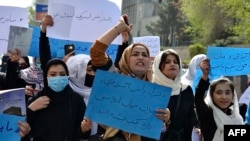Afghanistan’s Taliban leaders Tuesday ordered public and private universities across the country to immediately suspend female students access to higher education until further notice.
A spokesman for the higher education ministry, Hafiz Zia Hashami, said the order had been formally delivered to all universities in line with what he said was a Taliban cabinet decision.
The move is the latest in a series of restrictions the Taliban have placed on Afghan women’s access to public life and education since seizing power 16 months ago.
“This is really painful and heartbreaking for millions of girls prevented from high schools and now universities,” tweeted Mohsin Amin, an Afghan policy analyst and researcher.
The United States strongly condemned the development, calling it an “absolutely indefensible position.”
“The Taliban cannot expect to be a legitimate member of the international community until they respect the rights of all Afghans, especially the human rights and fundamental freedoms of women and girls. We will continue to work with this Council to speak with one voice on this issue,” U.S. Deputy U.N. Ambassador Robert Wood said in a statement.
Human Rights Watch swiftly denounced the ban.
“This is a shameful decision that violates the right to education for women and girls in Afghanistan,” Human Rights Watch tweeted.
“The Taliban are making it clear every day that they don't respect the fundamental rights of Afghans, especially women,” the global watchdog lamented.
The international community has not formally recognized the Taliban leadership because of its treatment of Afghan women and crackdown on human rights at large.
The Taliban regained control of Afghanistan in August 2021 as the United States and its Western allies withdrew troops from the country after nearly 20 years of war with the insurgent group.
Taliban leaders repeatedly assured Afghans and the world at large after seizing power that they would not bring back the polices of the previous rule to govern the impoverished, conflict-torn South Asian nation.
The group has reneged on its pledges and has increasingly excluded women from public life. Women are barred from visiting public places, including parks, baths and gyms. They are also required to cover faces in public. Females can visit health facilities and undertake long road trips only when accompanied by a male relative.
The Taliban have recently revived public flogging of alleged criminals and executions of convicted murderers in line with its strict interpretation of Islamic law or Sharia.
The radical group previously ruled Afghanistan from 1996 to 2001, when Taliban authorities would routinely carry out punishments in public, including floggings and executions at sports stadiums before crowds of spectators.





